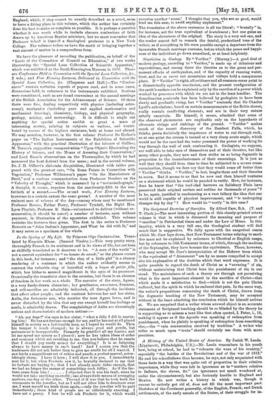In the Spring of My Life. By Princess Olga CantacuziSne.
Trans- lated by Eugenia Klaus. (Samuel Tinsley.)—This very pretty story, thoroughly French in its sentiment and in its views of life, has not been
BO skilfully translated as it deserves to be. " A man of the world " is not a correct equivalent for " un homme du monde," as the phrase occurs in this book, for instance ; and "the ring of a little girl " is a clumsy rendering of a sentence in which the author evidently means to contrast the valuable ring of betrothal with a !argue de petite fills, which has hitherto seemed magnificent in tho eyes of its possessor. Occasionally the translator rises to the occasion, but there is an absence of freedom in her work as a whole. The narrator of the story, Agnes, is a very finely-drawn character ; her gentleness, sweetness, firmness, and self-sacrifice are admirably indicated, all through the incidents that affect other people ; and the contrast between her and her sister, Anita, the fortunate one, who marries the man Agnes loves, and is never disturbed by the idea that any one except herself has feelings or needs, is admirably drawn. The complainings of Anita are charmingly serious and characteristic of modern notions :—
" Ah, my dear !" she says to her sister, " what a folly I did in marry- ing him ! He has not fortune enough for me, and he has not at all placed himself in society as a fashionable man, as I hoped he would do. Then his temper is much changed ; he is always good and gentle, but serionsnessals insupportable. Formerly he gratified all my fancies, and let me spend my money as I pleased ; now he has taken ideas of order and economy which are revolting to me. Can you believe that ho exacts that I should pay ready money for everything ? It is so fatiguing always to have money in one's hand ! And I assure you that the tradesmen did not ask better than to give mo credit for all I wanted. I saw lately a magnificent set of rubies and pearls, a perfect marvel, aston- ishingly cheap. I have it here ; I will show it to you. I immediately sent for it, but when Frederic saw it, be brutally declared to me that he forbade my baying it ; that I had already made debts enough, that we had no longer the means of committing such follies. As if the for-
tune came from him i I objected that it was his fault, since he would not take anything on credit ; one always finds means of arranging matters, one day or the other. The end of it was that he took back the ornaments to the jeweller, but as I will not allow him to domineer over me, I went myself too fetch them again,—only the jeweller will bo paid immediately ; those kind of people are so ridiculously exacting. I have not a penny. I fear he will ask Frederic for it, which would
occasion another scene.' I thought that you, who are so good, would lend me this sum, to avoid anything unpleasant."
The translation of the above sentences is all too literal ; "brutally" is, for instance, not the true equivalent of brutalement ; but one gains an idea of the cleverness of the original. The story is a very sad one, and the reader cannot fail to remark the fateful, predestined tone of the writer, as if everything in life were possible except a departure from the inexorable French marriage customs, before which the peace and happi- ness of the individual go down unnoticed, or at least helplessly.


































 Previous page
Previous page